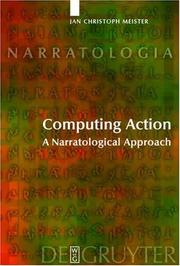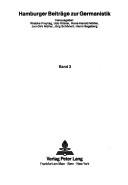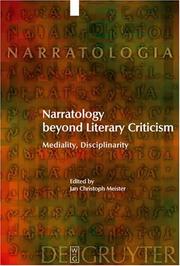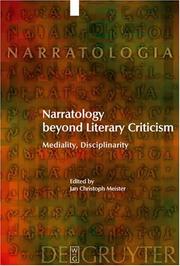| Listing 1 - 10 of 22 | << page >> |
Sort by
|

ISBN: 3110176289 9786612195501 1282195506 3110201798 9783110201796 9783110176285 9781282195509 Year: 2003 Publisher: Berlin ; New York : Walter De Gruyter,
Abstract | Keywords | Export | Availability | Bookmark
 Loading...
Loading...Choose an application
- Reference Manager
- EndNote
- RefWorks (Direct export to RefWorks)
Der theoretische Schwerpunkt der Arbeit liegt auf der Episode als der kleinsten geschlossenen Einheit erzählter Handlung. Die Episode wird definiert als ein Interpretationskonstrukt des Lesers, der eine Reihe distinkter Sachverhalte in der fiktionalen Welt als eine transformationelle Serie aus genau zwei Ereignissen konstruiert. Dieser Vorgang hat den konkreten Text zur Basis; er bezieht jedoch darüber hinaus sowohl das Weltwissen des Lesers ein und verläuft in Abhängigkeit von bestimmten logischen und semiotischen Regeln, die den Status von De-facto-Universalien des Lesens von Handlung besitzen. Neben der Formulierung neuer Definitionen für die Kernbegriffe Ereignis, Episode und Handlung stellt die Arbeit in einem computerphilologischen Teil eine neu entwickelte Softwareanwendung vor, die als Werkzeug zur Identifizierung, Auszeichnung und Analyse von Ereignissen im narrativen Text dienen kann. “Computing Action” takes a new approach to the phenomenon of narrated action in literary texts. It begins with a survey of philosophical approaches to the concept of action, ranging from analytical to transcendental and finally constructivist definitions. This leads to the formulation of a new model of action, in which the core definitions developed in traditional structuralist narratology and Greimassian semiotics are reconceptualised in the light of constructivist theories. In the second part of the study, the combinatory model of action proposed is put into practice in the context of a computer-aided investigation of the action constructs logically implied by narrative texts. Two specialised literary computing tools were developed for the purposes of this investigation of textual data: EVENTPARSER, an interactive tool for parsing events in literary texts, and EPITEST, a tool for subjecting the mark-up files thus produced to a combinatory analysis of the episode and action constructs they contain. The third part of the book presents a case study of Goethe's “Unterhaltungen deutscher Ausgewanderten”. Here, the practical application of theory and methodology eventually leads to a new interpretation of Goethe's famous Novellenzyklus as a systematic experiment in the narrative construction of action - an experiment intended to demonstrate not only Goethe's aesthetic principles, but also, and more fundamentally, his epistemological convictions.
82:800 --- 82:1 --- 82-3 --- Literatuur en taal --- Literatuur en filosofie --- Proza. Fictie. Narratologie --- Artificial intelligence. --- Narration (Rhetoric). --- Artificial intelligence --- Narration (Rhetoric) --- Engineering & Applied Sciences --- Computer Science --- 82-3 Proza. Fictie. Narratologie --- 82:1 Literatuur en filosofie --- 82:800 Literatuur en taal --- Narrative (Rhetoric) --- Narrative writing --- AI (Artificial intelligence) --- Artificial thinking --- Electronic brains --- Intellectronics --- Intelligence, Artificial --- Intelligent machines --- Machine intelligence --- Thinking, Artificial --- Rhetoric --- Discourse analysis, Narrative --- Narratees (Rhetoric) --- Bionics --- Cognitive science --- Digital computer simulation --- Electronic data processing --- Logic machines --- Machine theory --- Self-organizing systems --- Simulation methods --- Fifth generation computers --- Neural computers --- E-books --- 82-3 Fiction. Prose narrative --- Fiction. Prose narrative

ISBN: 3820493891 Year: 1986 Publisher: Frankfurt am Main Lang
Abstract | Keywords | Export | Availability | Bookmark
 Loading...
Loading...Choose an application
- Reference Manager
- EndNote
- RefWorks (Direct export to RefWorks)
Fantasy in literature --- Folklore in literature --- Mythology in literature --- Occultism in literature --- Meyrink, Gustav, --- Knowledge --- Folklore. --- Occultism.
Book
ISBN: 9783110222081 9783110227185 3110222086 9786613398925 1283398923 3110227185 9781283398923 6613398926 Year: 2011 Volume: 29 Publisher: Berlin ; New York : De Gruyter,
Abstract | Keywords | Export | Availability | Bookmark
 Loading...
Loading...Choose an application
- Reference Manager
- EndNote
- RefWorks (Direct export to RefWorks)
The present volume is targeted at an interdisciplinary audience, i.e. partly at literary scholars/narratologists interested in time theory outside their field, and partly at scholars outside literary studies who in turn would like to learn more about such concepts created in narrative theory. The anthology assembles both English-speaking and German contributions to a narrative theory of time constructs which have thus far not been translated into English, but have - directly or indirectly - inspired the theoretical discourse across disciplines. The common methodological focus of the articles assembled here concerns the way in which the experience of chronological structure and ordering in (experienced or imagined) phenomena can be traced back to a logic of time "constructs". Narrative time constructs - that is: models of chronological ordering which we generate while processing narratively encoded information - constitute a particularly rich body of examples. How we experience time is directly linked to how we narrate information, and how we re-construct principles of temporal ordering in the narrated content. The logic of narrative time constructs has therefore been of interest not only to narrative theory, but also to philosophy and cognitive science, and more recently to computational approaches toward modelling human time experience.
Philosophy of nature --- Fiction --- Thematology --- Literary rhetorics --- Time in literature --- Narration (Rhetoric) --- Time --- Philosophy --- 82-3 --- Proza. Fictie. Narratologie --- Time in literature. --- Literature. --- Narration (Rhetoric). --- Time. --- Tid i litteraturen. --- Narratologi. --- Tid --- Zeit. --- Motiv. --- Temporalität. --- Literatur. --- Philosophy. --- teori, filosofi. --- Time -- Philosophy. --- Languages & Literatures --- Literature - General --- 82-3 Proza. Fictie. Narratologie --- Narrative (Rhetoric) --- Narrative writing --- Rhetoric --- Discourse analysis, Narrative --- Narratees (Rhetoric) --- 82-3 Fiction. Prose narrative --- Fiction. Prose narrative --- Teori, filosofi. --- Time - Philosophy --- Anthology. --- Narrative Theory. --- Time Constructs. --- Temps --- Narration --- Temps (philosophie) --- Dans la littérature
Book
ISBN: 3476054152 Year: 2016 Publisher: Stuttgart : J.B. Metzler : Imprint: J.B. Metzler,
Abstract | Keywords | Export | Availability | Bookmark
 Loading...
Loading...Choose an application
- Reference Manager
- EndNote
- RefWorks (Direct export to RefWorks)
Diese Einführung vermittelt die Grundlagen der Erzähltheorie und gibt eine Anleitung zum praktischen Umgang mit Erzählliteratur. Sie erklärt die verschiedenen Aspekte der Erzähltextanalyse (Zeit, Erzähler, Modus, Stimme etc.) anhand von zahlreichen Textbeispielen und Musterinterpretationen. Dabei legen die Autor/innen einen weiten Begriff von Erzähltext zugrunde, der neben dem Kernbereich der fiktionalen Erzählliteratur auch andere Erzählformen und -medien umfasst. Mit Definitionen, zahlreichen Textbeispielen und Interpretationen. Für die dritte Auflage wurde der Band generell durchgesehen sowie aktualisiert und um Kapitel zur digitalen Textanalyse sowie zur Analyse von Comics erweitert.
Book
ISBN: 9783110176285 Year: 2003 Publisher: Berlin Walter De Gruyter
Abstract | Keywords | Export | Availability | Bookmark
 Loading...
Loading...Choose an application
- Reference Manager
- EndNote
- RefWorks (Direct export to RefWorks)

ISBN: 9783110183528 Year: 2005 Publisher: Berlin Walter de Gruyter
Abstract | Keywords | Export | Availability | Bookmark
 Loading...
Loading...Choose an application
- Reference Manager
- EndNote
- RefWorks (Direct export to RefWorks)
Fiction --- Literary rhetorics --- Pragmatics
Book
ISBN: 9783476022264 3476022269 3476050564 Year: 2008 Publisher: Stuttgart : Metzler,
Abstract | Keywords | Export | Availability | Bookmark
 Loading...
Loading...Choose an application
- Reference Manager
- EndNote
- RefWorks (Direct export to RefWorks)
82-3 --- Proza. Fictie. Narratologie --- 82-3 Proza. Fictie. Narratologie --- 82-3 Fiction. Prose narrative --- Fiction. Prose narrative --- Narratologie --- Analyse du discours littéraire --- Narration --- Manuels d'enseignement supérieur --- Rhétorique

ISBN: 3110183528 9786612195556 1282195557 3110201844 9783110201840 9783110183528 9781282195554 Year: 2005 Publisher: Berlin ; New York : Walter de Gruyter,
Abstract | Keywords | Export | Availability | Bookmark
 Loading...
Loading...Choose an application
- Reference Manager
- EndNote
- RefWorks (Direct export to RefWorks)
This anthology presents the results of the Second International Colloquium of the Narratology Research Group (Hamburg University). It engages in the exploration of approaches that broaden Narratology's realm. The contributions illustrate the transcendence of traditional models common to Narratology. They also reflect on the relevance of such a 'going beyond' as seen in more general terms: What interrelation can be observed between re-definition of object domain and re-definition of method? What potential interfaces with other methods and disciplines does the proposed innovation offer? Finally,
Mass media. --- Narration (Rhetoric) --- Storytelling in mass media. --- Discourse analysis, Narrative. --- Mass media and language. --- Language and mass media --- Narrative discourse analysis --- Narrative (Rhetoric) --- Narrative writing --- Mass communication --- Media, Mass --- Media, The --- Discourse analysis, Narrative --- Rhetoric --- Narratees (Rhetoric) --- Analyses --- Muziekfilosofie
Digital
ISBN: 9783110201796 9783110176285 Year: 2008 Publisher: Berlin ;; Boston De Gruyter
Abstract | Keywords | Export | Availability | Bookmark
 Loading...
Loading...Choose an application
- Reference Manager
- EndNote
- RefWorks (Direct export to RefWorks)
Digital

ISBN: 9783110227185 9783110222081 Year: 2011 Publisher: Berlin ;; Boston De Gruyter
Abstract | Keywords | Export | Availability | Bookmark
 Loading...
Loading...Choose an application
- Reference Manager
- EndNote
- RefWorks (Direct export to RefWorks)
| Listing 1 - 10 of 22 | << page >> |
Sort by
|

 Search
Search Feedback
Feedback About UniCat
About UniCat  Help
Help News
News